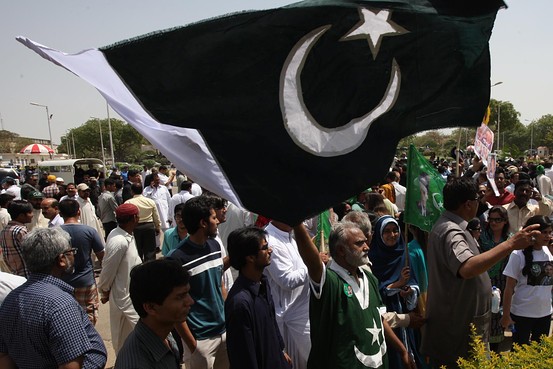
By: Annabel Symington
Source: WSJ Blog
More young people in Pakistan believe in military rule and Islamic Sharia law than in democracy, according to the findings of a new survey released by the British Council.
The nationally representative survey polled 5,271 people between the ages of 18 and 29 from across Pakistan. The results of the survey, titled “Next generation goes to the ballot box,” suggest that the political parties have a hard battle ahead of them if they want to restore hope to Pakistan’s disillusioned, disenfranchised and fairly conservative youth.
“I am a bit surprised by the results that indicate that the young populations have a preference for Shariah law,” says Rasul Bakhash Rais, a professor of political science at the Lahore University of Management Sciences, who was part of the research team for the very.
“But I am not surprised by the disgust in the government or the general conservative attitude of the youth,” he added.
Pakistan’s youth are likely to play a pivotal role in the upcoming election. Next month, 13 million first-time voters will head to the polls and 25 million registered voters are between the ages of 18 and 29 years of age.
When the British Council first set out to survey Pakistan’s youth in 2007, just over half of respondents thought the country was heading in the wrong direction. Today that figure stands at 86%.
Since the last elections, the majority of the survey respondents believe that governance has worsened. At the same time, they see the retreat of the military from political life and the advance of the judiciary – which has adopted an increasingly activist role in the country’s political landscape – as positive developments.
The results paint a concerning picture for politicians in the incumbent Pakistan People’s Party, who have frequently found themselves in locking horns with the judiciary.
Over the last five years, a slim majority of youth surveyed feel that access to clean water and food has improved, while access to other services and resources has declined. This includes access to fuel for cooking and transport, quality housing, healthcare and consumer good. Electricity tops the list: 84% of respondents say that access to electricity has worsened since the last election.
Despite this widespread disillusionment with the current political status quo, the majority of Pakistan’s youth do plan to vote in the upcoming elections. The election, set to take place on May 11, would mark the first transition of power from one democratically elected government to another.
A further 10% of those surveyed say that they could still be persuaded to head to the polls on May 11. This 10% represents an additional 2.5 million votes. Any party who can manage to bring out the undecided voters will have a significant advantage.
The majority (53%) of the youth surveyed consider themselves “religious”, with a further 17% labeling themselves as “conservative”.
The survey reveals that young women face very high levels of exclusion. Women are much less educated than men and many of them spend most of their time at home.
Women are less politically engaged and fewer than half of the ones surveyed expect to vote, even though nearly three quarters are registered to do so.
The survey identifies 12 million middle class young voters: young people who are more educated than their parents, marry later, live in better housing, earn incomes that have raised them above subsistence, and are connected by the media to each other and to the rest of the world.
These voters could represent a shift in Pakistan’s political landscape, which has historically seen voters casting their ballots according to deep-rooted patronage structures.
“There is some indication that voter behavior [in Pakistan] is evolving,” says Shamila Chaudhary, a Washington-based South Asia analyst, “These are people who want results based on social services, rather than voting for a party because they always have.”
“The survey reveals high levels of pessimism and overall distrust in authority,” says Prof. Rais, “We have to watch very carefully for how that will translate into political participation at the elections.”



